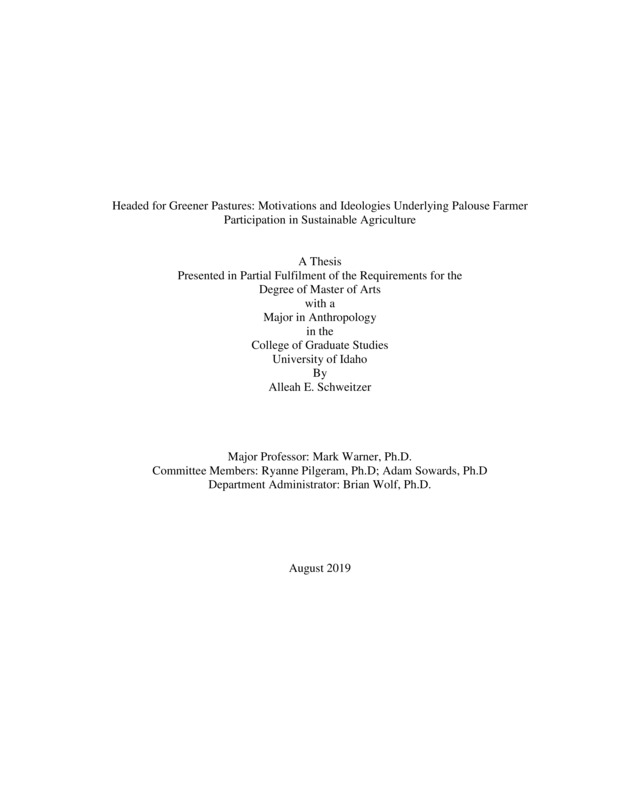Headed for Greener Pastures: Motivations and Ideologies Underlying Palouse Farmer Participation in Sustainable Agriculture
Schweitzer, Alleah E.. (2019-08). Headed for Greener Pastures: Motivations and Ideologies Underlying Palouse Farmer Participation in Sustainable Agriculture. Theses and Dissertations Collection, University of Idaho Library Digital Collections. https://www.lib.uidaho.edu/digital/etd/items/schweitzer_idaho_0089n_11643.html
- Title:
- Headed for Greener Pastures: Motivations and Ideologies Underlying Palouse Farmer Participation in Sustainable Agriculture
- Author:
- Schweitzer, Alleah E.
- Date:
- 2019-08
- Keywords:
- Food Systems Ideology Sustainability
- Program:
- Anthropology
- Subject Category:
- Agriculture
- Abstract:
-
The Palouse, a bioregion that incorporates parts of eastern Washington and northern Idaho, has arguably become synonymous with a single livelihood: farming. The substantial production of wheat and legumes through conventional methods constitutes the cultural and economic fabric of this region. Small farms are far and few between this vast, undulating prairie because the history of Palouse agriculture has not always accommodated small farms—factors like a railroad boom, government incentives, and mechanization have historically supported larger farms over homesteads. This project examines the people who choose sustainable agriculture over conventional farming. The definition of sustainable agriculture is ambiguous but often combines small-scale agriculture and organic methods with a set of varying ideologies that oppose conventional practices (like chemical use, monocropping, and tillage). Consequently, the sustainable food movement accommodates a diverse range of ideologies, with farmers from the far left and the far right able to justify their participation in sustainable practices.
The Palouse farmers that contributed to this study were politically conservative, economically libertarian, religious, and pro-environment. While their belief systems were unique and not representative of all Palouse farmers, they surprisingly straddled beliefs held in both conservative and liberal circles. Through qualitative methods, I propose that four motivations constitute their ideological framework: nostalgia, masculinity, Christian fundamentalism, and libertarianism. Farmers in this study, referred to as Christian conservative sustainable farmers, navigate pro-environmental stances by justifying them through these core values. The beliefs and stances of prominent Christian conservative authors Wendell Berry and Joel Salatin are juxtaposed to Palouse farmers responses to better articulate how their unique positions are justified.
The mainstream sustainable food movement has in its own way become synonymous with a few of its own descriptors: liberal, secular, and pro-environment. These farmers strayed from mainstream ideation, raising questions about why the sustainable food movement is so strongly associated with the political Left. In this thesis, I address the ideological diversity of the sustainable food movement and the greater societal impacts of an ideologically inclusive sustainable food system.
- Description:
- masters, M.A., Anthropology -- University of Idaho - College of Graduate Studies, 2019-08
- Major Professor:
- Warner, Mark
- Committee:
- Pilgeram, Ryanne
- Defense Date:
- 2019-08
- Identifier:
- Schweitzer_idaho_0089N_11643
- Type:
- Text
- Format Original:
- Format:
- application/pdf
- Rights:
- In Copyright - Educational Use Permitted. For more information, please contact University of Idaho Library Special Collections and Archives Department at libspec@uidaho.edu.
- Standardized Rights:
- http://rightsstatements.org/vocab/InC-EDU/1.0/

